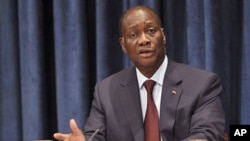The president of Ivory Coast said justice will be applied equally to his supporters and those of former President Laurent Gbagbo, who were involved in the country's recent post-election violence. Speaking at a news conference at the United Nations, Alassane Ouattara said his former rival will be tried for some alleged crimes in Ivory Coast and for others, the government will seek help from the International Criminal Court.
President Ouattara said his top priority is Ivorian reconciliation after the country was torn apart by violence following the disputed presidential election in November.
He told reporters that there would be no distinctions in the application of justice for his own supporters and for supporters of Gbagbo. Fighters on both sides are accused of contributing to the bloodshed that killed more than 3,000 people.
“I want to be perfectly clear: that there will be no exception," said Ouattara. "All Ivorians are equal and they should be treated equally. That is why I set up a National Commission of Inquiry last week, and that Inquiry Commission will look at all the events that took place since the elections, especially in the western part of the country where hundreds of people got killed.”
He said those who have committed crimes will face trial, and if found guilty they will be punished.
He said Gbagbo and his wife, whose capture in April marked the end of the political crisis, are being held in the presidential palace in the north of the country. He said that under Ivorian law, persons of Gbagbo’s rank must be treated in a dignified manner.
Asked whether Gbagbo would be tried in Ivory Coast or at the International Criminal Court at The Hague, Ouattara said there are two options.
“The first one is for anything linked to economic crimes, to the attempt to keep power without having being elected, what we say in France, 'tentative de destabilisation', they will be tried in Cote d’Ivoire because we have the means to do it," said Ouattara. "But the judicial system has been completely disrupted, even destroyed, over the past 10 years. For the important crimes, the grave crimes, like crimes against humanity, war crimes, and others, that we have asked the International Criminal Court to help us with those types of crimes.”
He added that Gbagbo would receive a fair trial.
During the crisis, Gbagbo was accused of hiring Liberian mercenaries to help him stay in power. Ouattara said he is concerned about the possible lingering threat to security from these individuals, and has agreed with Liberia to exchange information about mercenaries crossing the Ivorian-Liberian border. He said he also is working on a plan for border security.
Earlier, Ouattara met with U.N. Secretary-General Ban Ki-moon. The United Nations said they discussed issues related to the strengthening of state institutions, the restoration of the rule of law, human rights, and the fight against impunity and national reconciliation. The secretary-general expressed the hope that the legislative elections would draw broad participation, including opposition parties.
Ouattara said he hopes the parliamentary elections will go forward in late November or early December. He said it is important to start the new year with all state institutions in place.
Ivorian President Says Justice Will Be Applied Equally




